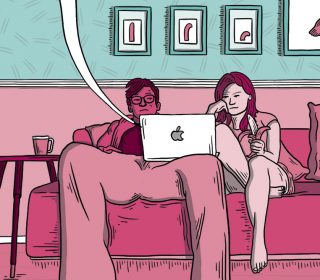It’s time to celebrate sarcasm…

Last week, I said to the chemist, ‘Can I have some sleeping pills for the wife?’ He said, ‘Why?’ I said, ‘She keeps waking up.’
Did you allow yourself a guilty chortle at that? Or is this joke – from 1970s king of comedy, Les Dawson – sexist and clearly encouraging the systematic oppression of women?
Where you stand on that will perhaps determine your take on ‘banter’. Banter is defined as ‘the playful and friendly exchange of teasing remarks’ which is dictionary-talk for ‘taking the Mickey’ – which, for centuries, has been a great British pastime. Our globally-renowned GSOH used to define us. But recently, banter, and its shorthand ‘bantz’, is a dirty word: a catch-all for everything that’s toxic about modern masculinity.
BANTZ BACKFIRED
Yet, as a man, the mates I love the most are the ones I most mercilessly rib. It’s just how men roll.
Yet banter’s often vocal opponents see it as a way of legitimising bigotry or bullying. As a consequence, inappropriate banter can ruin highprofile men’s careers. Top Gear presenter Jeremy Clarkson, comedian Dapper Laughs and disgraced Nobel Laureate scientist Sir Tim Hunt – who said female scientists cried in laboratories – are proof.
A FINE LINE
So, where does banter end – and bullying begin? Well, it’s complicated. While only an idiot white person would use the N-word, black people use it as a term of endearment. They’ve seized it back from its oppressive origins and made it their own. This underlines the complexities of banter that are completely missing on computer screens or in newspapers, where comments are isolated and stripped of nuance and context.
But while banter can destroy lives, it can save them, too. In my work as a campaigner on men’s mental health issues, I’ve learned from the Samaritans and other men’s charities that, in group therapy and on suicide and domestic abuse helplines, depressed men depend upon banter to break the ice.
LIFE-SAVER
I’ve witnessed suicidal men quickly go from tears of laughter to genuine sobs of desolation that take them towards the first steps to a recovery. And banter got them there. Yet tragically, we are growing increasingly afraid to use risqué humour for fear of appearing racist/sexist/homophobic/whatever. As a result, we’re losing sight of what makes Britain unique – and what makes us happy as individuals.
So, I’m proposing we raise a middle finger to the language police who’d like to cull comedy. It’s time to celebrate sarcasm, to cry, ‘Gawd bless you, banter!’ After all, the world is a testing enough place without the joy of laughter.






